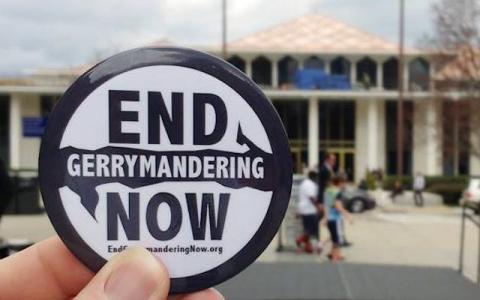Everybody hates gerrymandering. That’s the takeaway from a new poll that finds dramatic majorities of Americans in favor of limiting the ability of politicians and partisans to draw their own districts.
The survey – a bipartisan poll conducted by Democratic researcher Celinda Lake and Republican analyst Ashlee Rich Stephenson – found that 71 percent of Americans would like the Supreme Court to define a standard that ends extreme partisan gerrymandering.
This cuts across party lines: 80 percent of Democrats, 68 percent of independents, and 65 percent of Republicans would back action by the Court.
“It’s hard to find bipartisan consensus in America today,” Lake said, presenting the findings at a Washington media conference. “This issue has bipartisan consensus even among partisan voters.”
The Court will soon have it’s chance: Oral arguments in a partisan gerrymandering case from Wisconsin, Gill v. Whitford, will be heard on October 3.
The Wisconsin maps, drawn by Republican legislators, created such GOP-friendly maps that the party won 60 of 99 State Assembly seats in 2012 even though Democrats won more total votes.
This poll, however, discovered that voters are turned off by partisan map-manipulation, even when it is to the benefit of their side. It found that 73 percent of voters wanted to remove all political bias from redistricting – regardless of whether it cost their party seats.
“Freely choosing their representatives is an issue of deep principle for voters of all political stripes,” said Stephenson, the Republican pollster.
Lake called this strong support “really surprising” since gerrymandering is a new issue for many people, and often considered esoteric or technical. But she and Stephenson suggested that voters see this as a core issue of electoral fairness, no matter their partisan allegiance.
Strong majorities – 75 percent of Democrats, 81 percent of independents and 61 percent of Republicans -- agreed that “we lose the guaranteed freedom to choose our own leaders when electoral maps are drawn to favor one political party.”
Gerry Hebert and Paul Smith, who will argue the case before the Supreme Court, said that they hope the Court will seriously consider this deep support among Americans for action while deliberating a first-ever constitutional standard to rein in excessive partisan gerrymandering.
“In a case as clear as this, we hope that the court will rise to the occasion,” Smith said, “thereby restoring democracy.”
The poll was conducted on behalf of the Campaign Legal Center, which is helping represent the Wisconsin voters who challenged the maps. The details from the survey can be found here.
Editor's note: This article, written by Dave Daley, originally published on FairVote's blog, and has been modified slightly for publication on IVN.
